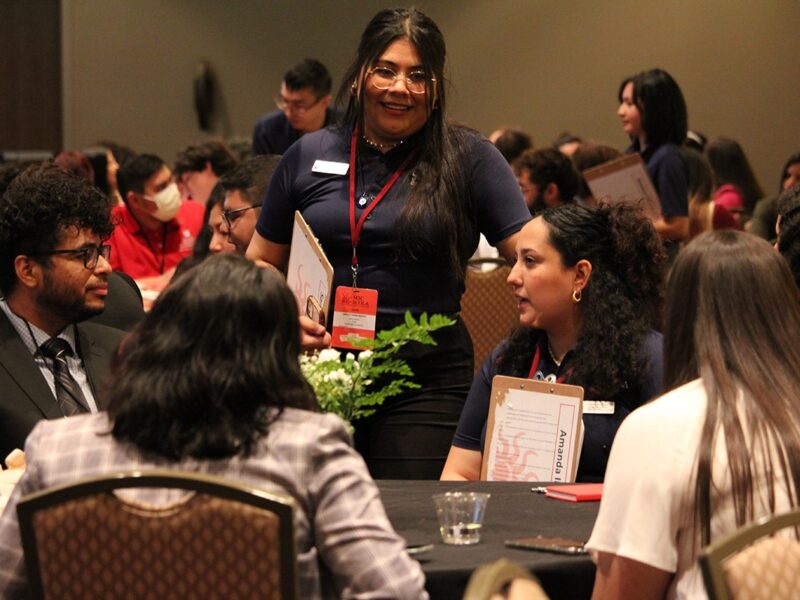Off The Quad
 Seeing Angela Merkel was the bonus. Last fall, Jacob Brown ’16 was one of seven cadets who spent the semester at Helmut Schmidt University (HSU) in Hamburg, Germany, as part of a Texas A&M University Corps of Cadets exchange program. In November, he traveled to Berlin for the 25th anniversary of the collapse of the Berlin Wall. There he found the city transformed into an open-air museum with exhibits depicting Berlin’s post-war transformation. At one display, Brown spotted German Chancellor Angela Merkel. “That made my trip an especially memorable experience,” he said.
Seeing Angela Merkel was the bonus. Last fall, Jacob Brown ’16 was one of seven cadets who spent the semester at Helmut Schmidt University (HSU) in Hamburg, Germany, as part of a Texas A&M University Corps of Cadets exchange program. In November, he traveled to Berlin for the 25th anniversary of the collapse of the Berlin Wall. There he found the city transformed into an open-air museum with exhibits depicting Berlin’s post-war transformation. At one display, Brown spotted German Chancellor Angela Merkel. “That made my trip an especially memorable experience,” he said.
But the most powerful part of the visit was seeing the contrasting worlds on either side of the wall. “Berlin is one of the few places you can see a stark juxtaposition between the effects of communism and capitalism,” said Brown, an international studies major. He noticed that in former East Berlin, the buildings were more drab and the streets narrower. The setting depicted how constricted life for East Berliners had been. “The biggest realization I had was the constant fear that people lived under,” said Brown. “The idea that citizens could not control many aspects of their lives had a profound impact on me and made me thankful for the freedoms I experience every day in the U.S.”
This kind of exploration of the world, fraught with critical thinking and historical inquiry, is exactly what Brig. Gen. Joe Ramirez Jr. ’79, Corps commandant, hopes his cadets will achieve through a project that is close to his heart: The Corps’ Global Leadership Initiative. The commandant goes to great lengths to give cadets the chance to learn about other countries through this cross-cultural initiative, which has grown tremendously in size and significance since he took command of the Corps in 2010.
At the time, the Corps sent a few cadets abroad through programs funded by the university or the Department of Defense. “I thought to myself: ‘Let’s send more,’” said Gen. Ramirez, who spent seven of his last 10 years in the Army either living overseas or deployed. Before coming to College Station, he served as deputy director of policy and strategy for the U.S. European Command.
His international experience made his goals for the Corps clear. “I realized the significance of ensuring that our young people understand the global marketplace,” he said. “Having traveled to countries around the world, I know the advantages to understanding a country’s environment, culture and the way its people view the world.”
Gen. Ramirez and his staff built an international program tailor-made for Aggie cadets. His priorities became three all-expense-paid excursions a year, semesters abroad at military universities and an international exchange plan to bring foreign cadets to College Station. The commandant also set up the Leadership Learning Center, where cadets have free access to a library of Rosetta Stone programs to study critical languages such as Russian, Mandarin and Arabic. Since the program’s inception, the number of cadets traveling overseas has jumped dramatically. In 2007, less than 1 percent of Texas A&M students who studied abroad were cadets; today cadets comprise 12 percent.
“Our hope,” said Randy Kluver, Texas A&M’s executive director of global partnerships and outreach, “is that every cadet gains some form of international engagement over the course of their education.” Kluver helped implement the program from the beginning and is one of its most adamant endorsers.
The cornerstone of the Corps’ international program is three annual excursions, normally taken at the conclusion of the spring semester. “This is study abroad on steroids,” said Kluver. “The quality of the experience is unparalleled.”
The excursions normally consist of 10 to 12 days in countries that are strategically important to U.S. interests—such as Egypt, Morocco, Germany, Poland, China, Taiwan, Singapore and Chile. But these are no leisurely sightseeing vacations. Accompanying the 26 cadets that travel on each excursion are three chaperones—a staff member from the commandant’s office, an ROTC officer and a Texas A&M faculty member who has special knowledge of the destination country or region.
Before they travel, cadets receive detailed briefings from experts on the country’s culture and government so they can hit the ground running. Days abroad are packed with meetings with key decision-makers and tours of influential institutions. Gen. Ramirez adapted the excursions—from which cadets earn an hour’s worth of academic credit—after the DIME-R model he learned at the U.S. Army War College. Each trip examines the elements of national power: diplomacy, information, military, economics, religion and culture.
“When we decide which countries we’re going to, we all look through our contacts to see who we know could help us,” said Kluver. The commandant himself provides connections since he has worked in many of the destinations while serving in the Army. The Aggie network lends a hand as well, with many Texas A&M former students providing suggestions and contacts. “Almost every embassy employs someone from Texas A&M,” said Kluver. “And because it’s the Corps, someone with the military is always willing to help.”
Gen. Ramirez, who speaks with each group of cadets before their departure, is specific about what they should take from their time away. “I want them to learn how we do business with that country diplomatically, how the country uses information as influence, and what the information is saying, especially about the U.S.,” Gen. Ramirez explained. “What type of military relationship do we have with them? What companies are doing business there? And while religion is not always a significant factor in every country, they must be conscious of it when they go to countries like Qatar and Kuwait.”
Last summer’s excursion to India took place in the weeks leading up to national elections. “Cadets got the chance to understand who all of the different candidates were and how they were being discussed—not just by the media but by local people,” Gen. Ramirez said. On a 2013 trip to China, Kluver was able to arrange the first cadet-to-cadet exchange between the countries, thanks to his position as director of the Texas A&M Confucius Institute, which strengthens educational ties with China. Members of the Corps spent time with cadets at Ocean University in Qingdao, one of the only universities in China with an ROTC program. “We engaged in discussions with the cadets and addressed numerous historical events and current issues between our two nations,” said Sam Hodges ’13, who took part in the China trip.
These excursions are set up in unique Texas A&M style. “West Point can’t do an exchange like the one in China,” said Kluver. “The Air Force Academy can’t do this. But we can because of our select military relationships and Aggie connections.”
Stories about the impact of the trips continue. Gen. Ramirez recalls that cadets on a 2012 excursion to Qatar got a tour of the Al Udeid Air Base and an unexpected briefing from Lt. Gen David Goldfein, commander of the U.S. Air Force Central Command in Southwest Asia. “It is rare for a three-star general to give three hours to a group of students,” said Kluver. “In fact, it doesn’t happen.” One clue to his generosity: the general’s two daughters are Aggies. “It was fascinating for our cadets to see how that operation came together,” said Gen. Ramirez.
Clayton Sorem ’13, who participated in that Qatar excursion, recalls another memorable meeting with the head of international relations at the Al Jazeera network. “The ability to ask questions about a news program that many people in the U.S. find controversial was an eye-opening experience,” said Sorem, whose trip inspired him to spend a year in China after graduation. “We learned about some of our misconceptions of the Middle East. I also saw how various factors lead people to completely different conclusions about certain topics and none are necessarily wrong.”
Insights like these are commonly heard during the mandatory three-hour outbriefings that cadets give the commandant following each excursion. The students are required to be thorough in these briefings, not only to prove how much they learned but also because the commandant listens with preexisting knowledge about each country. “They need to show him that they’re thinking deeply about what it all means,” Kluver noted. “The commandant does not let them off easy.”
At these briefings, Gen. Ramirez loves to “see the light bulbs going on,” he said. “You hear things like, ‘I never knew…’ or ‘Now I understand….’ These are the students we’re preparing for companies like IBM, Dell, Goodyear, ExxonMobil or the CIA and the U.S. military. That’s why these trips are so important.”
Another key area of the program is the coordination of longer exchanges like the one the Corps of Cadets established with HSU in Germany. This is where Brown and six other cadets discovered there is no substitute for experiencing current events as well as history firsthand. “We actually talked about the reunification of Germany quite extensively in a German history class I was taking at HSU,” said Reiner Guenther ’16, an agricultural economics major. “But of course you can only get to a certain level of understanding through words, pictures and videos. Going to Berlin was extremely powerful and probably the best history lesson I’ll ever receive.”
At the same time, three HSU cadets studied in Aggieland, immersing themselves in all of the Corps of Cadets’ activities—even marching off the Quad in their own German uniforms before a football game. Having foreign students in College Station brings a global perspective to members of the Corps who haven’t been able to travel overseas. “That’s the beauty of these exchanges,” said Gen. Ramirez. “There’s great value in having international cadets here interacting with our cadets. It’s the same kind of learning that goes on as if our cadets were in their country with them.”
Nick Mogensen ’15 served as a “buddy” to a cadet when groups of South Korean ROTC students visited for three weeks each in 2014 and 2015. He gained an appreciation for the pressure under which those cadets live, with the threat of an invasion from North Korea always looming. “It is one thing to read a CNN news blurb about tensions between North and South Korea, and another to befriend a South Korean cadet over the course of three or four weeks. One minute you are discussing your hometown and hearing about their family, and the next you are discussing the politics and foreign relations of South Korea,” said Mogensen, whose experience traveling abroad prompted him to apply for a master’s program at The Bush School of Government and Public Service, which he completed simultaneously with his undergraduate degree in international studies.
“A cadet’s global competence is more than what they learn in-country or in a classroom. The friendships that form as a result of an international experience greatly impact a cadet,” said Meredith Simpson ’03, assistant commandant for academics and international programs. “Whether they seek a military commission or a career in the private sector, these cadets build a network they can call upon later.”
The commandant recently set up an exchange with the Australian Defence Forces Academy, sending four Aggie cadets in the spring semester, and he hopes to establish the same with schools in Chile, Taiwan and possibly Mexico. He also would like to expand the program with South Korea. The South Korean ROTC leaders want to bring cadets for a third time in 2016, and Gen. Ramirez is eyeing May 2016 as a date when some of his cadets could visit Korea.
“Now I want our cadets to come to your country to see how you operate,” Gen. Ramirez told 34 South Korean cadets in a conference room in the Sanders Corps Center, after hearing what they’d learned after three weeks of living with Aggie cadets and completing a leadership course. “That will give our cadets the chance to learn about your program, your culture and the beauty of your country.” Gen. Ramirez explained his own connection to their country; not only did he serve in Korea but his father did as well, during the Korean War. “He was shot five times and spent 33 months as a prisoner of war,” he said. The Korean cadets gasped. “I’d like our cadets to see the importance of what we have done in Korea with our Korean partners,” he added.
Then Gen. Ramirez gathered for a photo with the cadets. “I’ll show this to my father,” he promised as he stood grinning, surrounded by smiling young Koreans, all with their thumbs raised. “Gig ’em!” they said in unison.
This article by Jeannie Ralston originally appeared in the Texas A&M Foundation Spirit magazine.





